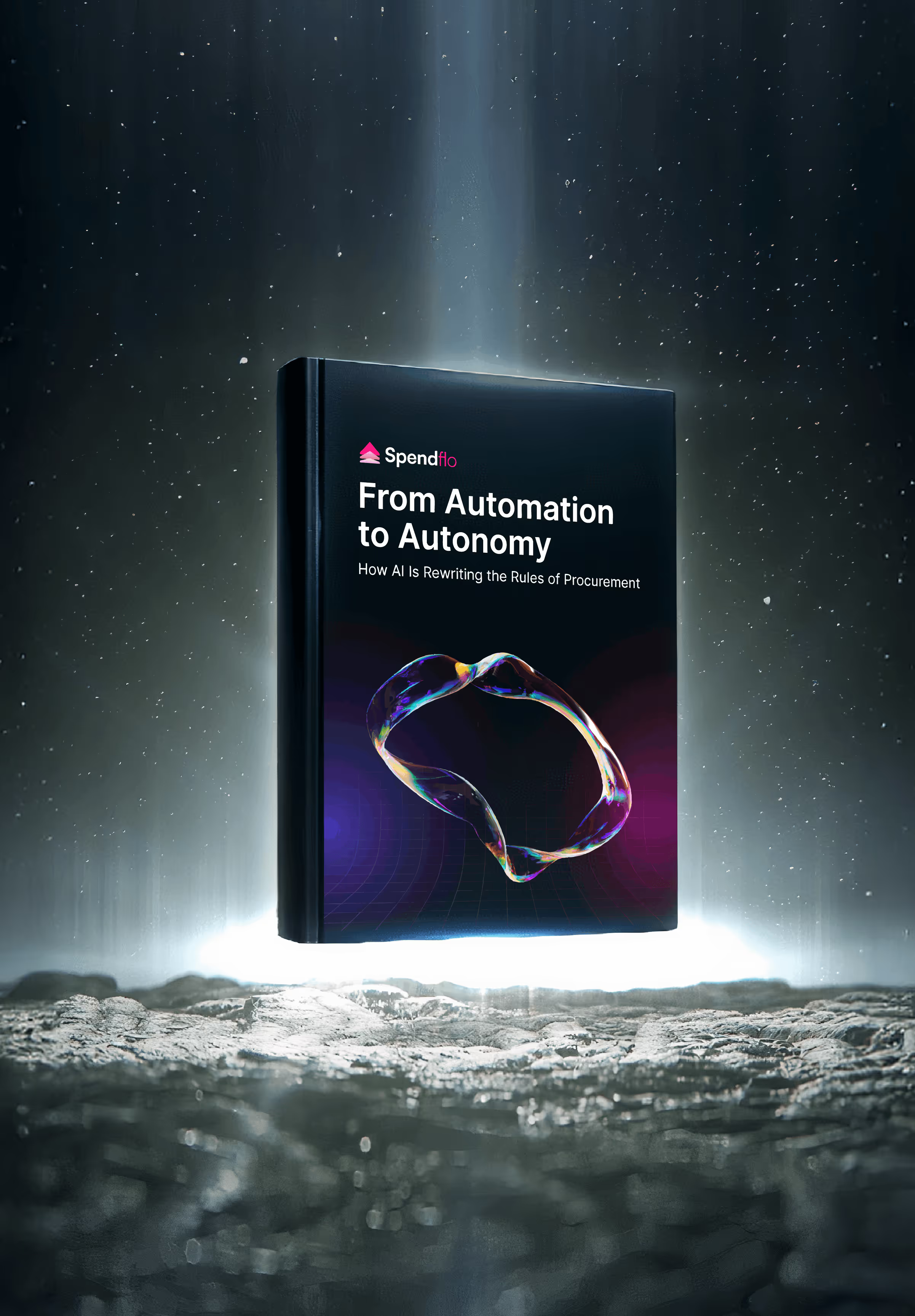

What Is A Procurement Manager? (+10 Roles & Responsibilities)
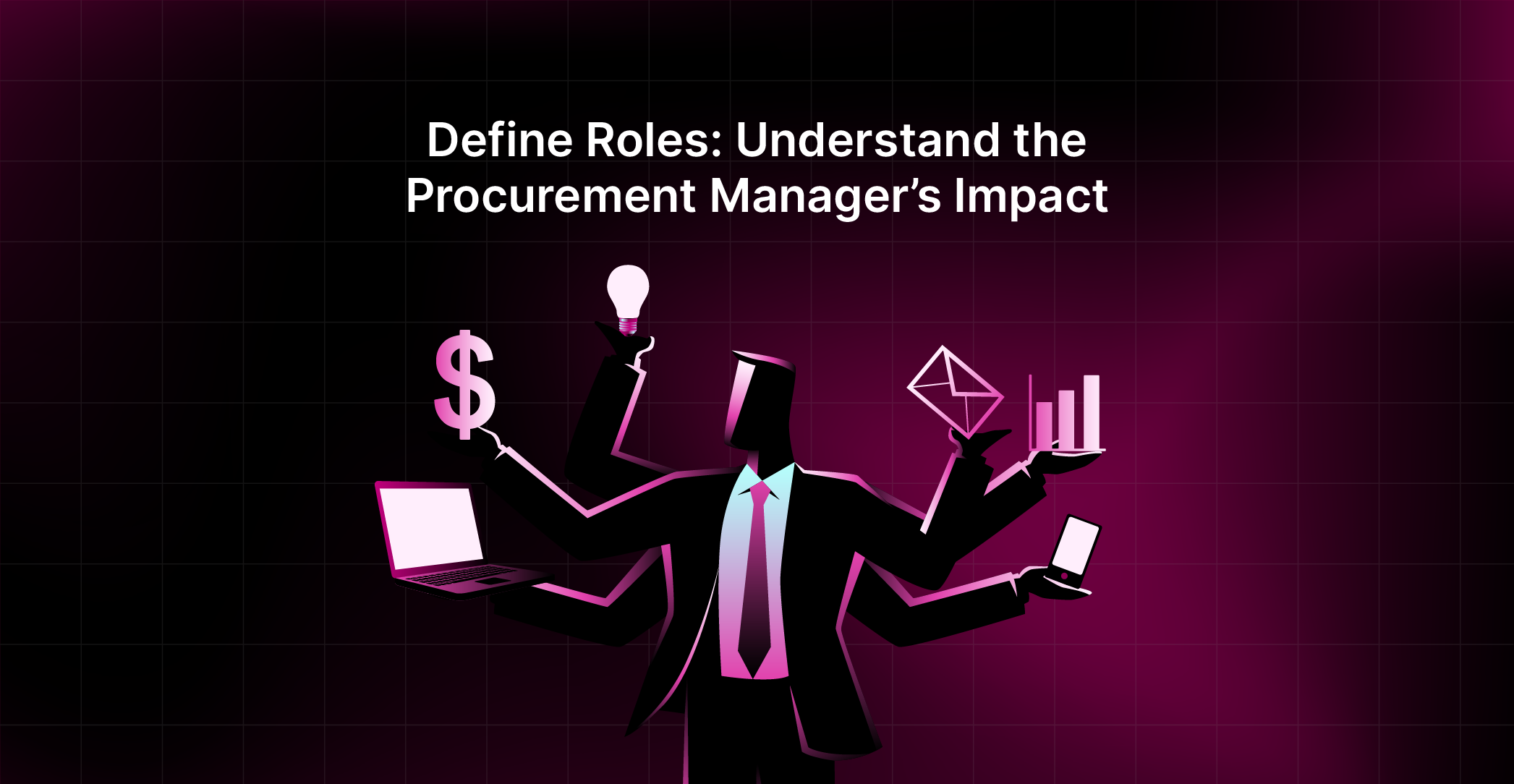
What Is A Procurement Manager? (+10 Roles & Responsibilities)
Explore how to become a procurement manager—roles, responsibilities, skills, certifications, and career steps explained in a single guide.


A procurement manager plays a vital role in managing the sourcing and acquisition of goods and services for an organization. From negotiating contracts to optimizing supplier relationships, they ensure smooth operations and cost control. In this blog, we explore what a procurement manager does, the skills and qualifications required, and the steps to become one.
What Does a Procurement Manager Do?
A procurement manager is responsible for sourcing, negotiating, and managing relationships with suppliers to receive quality goods and services at optimal prices. They play a strategic role in maintaining cost efficiency, ensuring compliance, and building long-term supplier partnerships that support business goals.
Procurement Manager Role And Responsibilities
A procurement manager oversees sourcing, negotiating, and managing vendor relationships to procure goods and services. This role requires strategic thinking, cost management, and the ability to ensure compliance while building strong supplier partnerships. Effective procurement drives efficiency and cost savings.
Key responsibilities of a procurement manager include the following:
1. Supplier Sourcing and Evaluation
Procurement managers identify and assess suppliers to ensure they meet quality, pricing, and reliability standards for long-term partnerships. This thorough vetting helps build a stable and trustworthy supply chain.
2. Contract Negotiation Tactics
They negotiate terms and prices to secure favorable contracts that align with the organization’s financial and operational goals. Effective negotiation can achieve cost savings and stronger supplier relationships.
3. Managing Supplier Relationships
Strong relationships are maintained with suppliers to ensure consistent quality, timely deliveries, and mutually beneficial agreements. Ongoing communication and regular evaluations help sustain these valuable partnerships.
4. Data-Driven Procurement Analysis
Analyzing data helps procurement managers identify cost-saving opportunities, optimize purchasing decisions, and forecast future needs. Data insights also enable businesses to make informed decisions for achieving strategic goals.
5. Effective Risk Management Strategy
Procurement managers proactively assess and mitigate risks, ensuring continuity of supply and compliance with regulatory requirements. A well-developed risk strategy helps businesses protect themselves against disruptions and financial losses.
6. Quality Assurance
Quality standards are enforced through regular supplier assessments and by maintaining clear product specifications and delivery expectations. This ensures that all goods and services meet organizational standards.
7. Policy Compliance Strategies
Procurement managers uphold compliance by implementing policies that align with legal regulations and corporate standards. Adherence to these policies minimizes risks and ensures ethical practices.
8. Effective Communication
Clear communication is essential to manage vendor expectations, aligning internal goals, and fostering collaboration across departments. Strong communication also supports timely issue resolution and smooth procurement processes.
9. Inventory Management
They oversee optimal stock levels, ensuring optimal stock availability and minimizing costs associated with overstock or stockouts. Accurate inventory management enhances operational efficiency and meets demand consistently.
10. Leadership Skills
Strong leadership is required to guide teams, promote a collaborative environment, and ensure alignment with organizational objectives. Effective leaders inspire performance and drive strategic procurement initiatives forward.
Challenges in the Procurement Manager Role
Procurement managers face unique challenges that go beyond day-to-day purchasing tasks. They are responsible for navigating supplier risks, ensuring transparency, managing disruptions, and maintaining compliance - all while meeting cost and quality targets. Here are the most common hurdles faced in this leadership role:
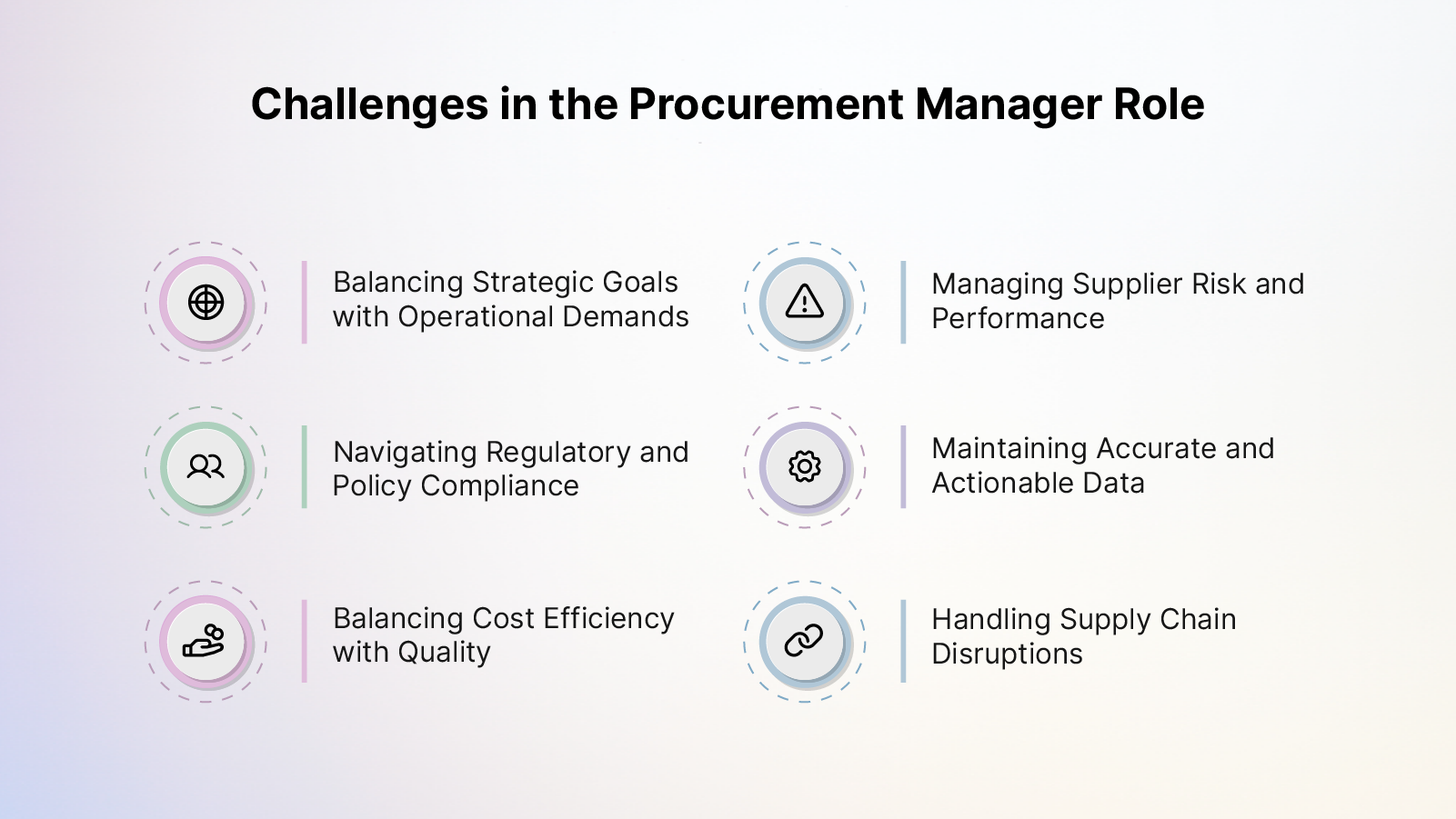
1. Balancing Strategic Goals with Operational Demands
Procurement managers must align daily purchasing operations with long-term business goals. While managing urgent requests, they also need to think strategically about vendor relationships, cost control, and contract efficiency - often without sufficient resources or time.
2. Managing Supplier Risk and Performance
Evaluating supplier reliability and anticipating potential risks is a constant challenge. Procurement managers are expected to ensure business continuity by diversifying vendors, conducting performance reviews, and building resilience into the supply chain.
3. Navigating Regulatory and Policy Compliance
Staying updated on changing regulations and ensuring procurement activities comply with company policies and industry laws is a critical part of the role. Managers must also enforce internal compliance and avoid costly legal risks.
4. Maintaining Accurate and Actionable Data
Procurement decisions rely on data - but procurement managers often struggle with fragmented systems, inconsistent inputs, and outdated reports. Ensuring data integrity across spend, usage, and vendor performance is a continuous challenge.
5. Balancing Cost Efficiency with Quality
While cost savings are essential, procurement managers cannot compromise on quality. Finding vendors that deliver both value and reliability requires negotiation skills, market awareness, and a deep understanding of total cost of ownership.
6. Handling Supply Chain Disruptions
Unexpected events like geopolitical shifts, raw material shortages, or logistics delays directly impact procurement timelines. It’s up to the procurement manager to proactively mitigate these disruptions by maintaining backup suppliers and flexible sourcing strategies.
Educational Background and Certifications for Procurement Managers
Procurement managers can enhance their skills and marketability through specialized certifications and advanced education and become procurement specialists. Earning certifications like the CPSM, CSCP, or CIPP builds expertise, while pursuing training from leading schools offers comprehensive insights into supply chain management.
A) Top Certifications for Procurement Professionals
Obtaining certifications can significantly enhance a procurement manager’s skills and career prospects. Here are some certifications considered to be some of the most prestigious:
- Certified Professional in Supply Management (CPSM) by Institute for Supply Management (ISM) is highly valued for covering strategic sourcing and supplier relationship management.
- Certified Supply Chain Professional (CSCP) by Association for Supply Chain Management (ASCM) emphasizes end-to-end supply chain expertise.
- Certified Public Procurement Officer (CPPO) by the Universal Public Procurement Certification Council (UPPCC) is tailored to public sector needs.
- Certified International Procurement Professional (CIPP) from the International Purchasing and Supply Chain Management Institute (IPSCMI) has global recognition.
- Diploma in Procurement and Supply from the Chartered Institute of Procurement & Supply (CIPS) is another good option.
B) Leading Schools for Procurement Education and Training
Leading institutions offer programs that provide a strong foundation in procurement and supply chain management.
- The Wharton School at the University of Pennsylvania is renowned for its strategic approach to supply chain management.
- Michigan State University offers hands-on learning in procurement and logistics.
- Cranfield School of Management in UK is a leader in advanced procurement practices.
- Rutgers Business School combines theory with practical industry insights.
Essential Skills for Procurement Managers
Procurement managers require a variety of skills, including negotiation, analytical abilities, and relationship management. Financial acumen, contract management expertise, and technological proficiency are also crucial for securing cost-effective terms, maintaining supplier partnerships, and driving strategic procurement initiatives.
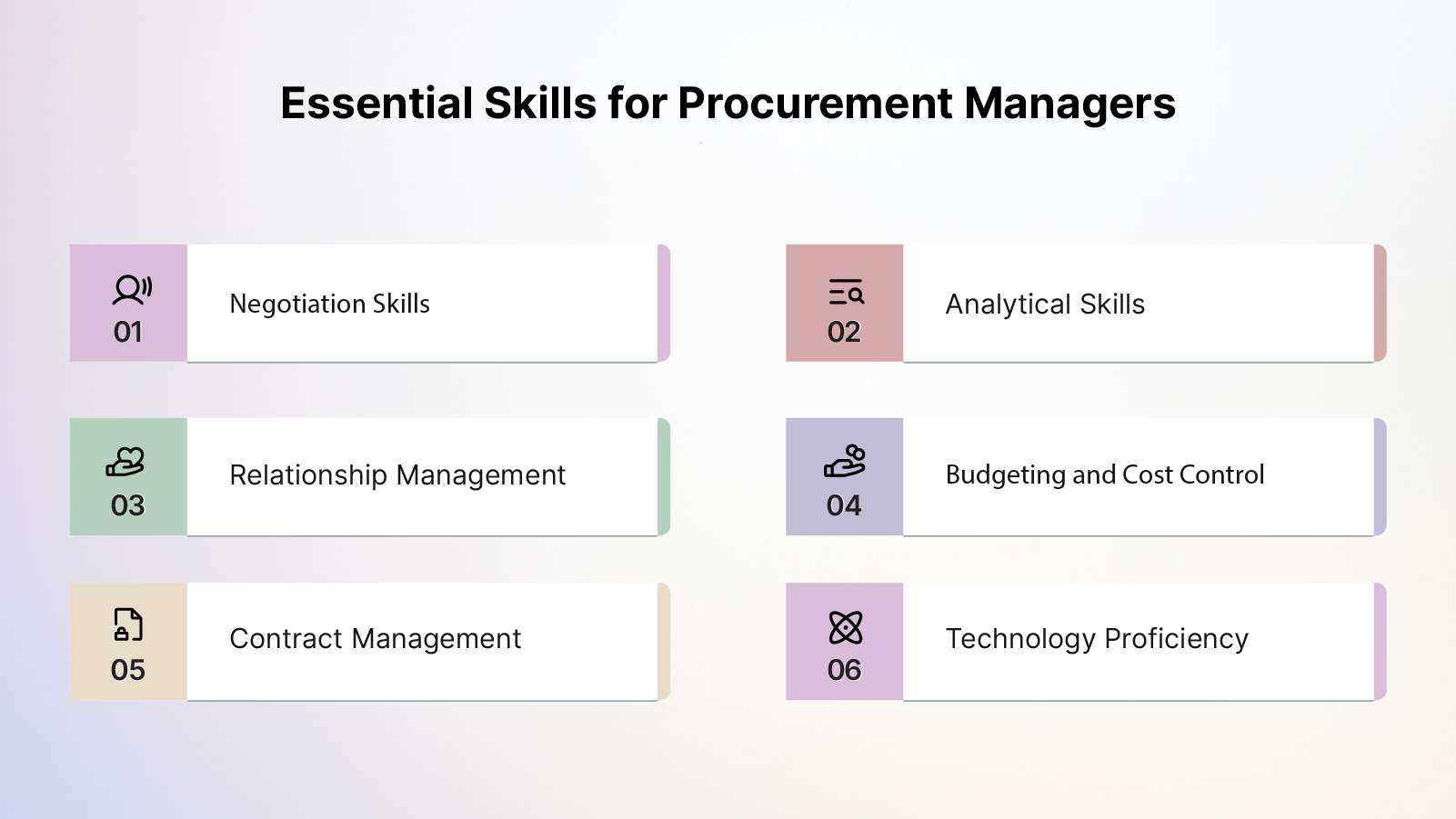
Some of the key skills for procurement managers include:
1. Negotiation Skills
Excellent negotiation skills help procurement managers to secure favorable terms. By understanding market dynamics and supplier motivations, they ensure cost savings and achieve optimal value in procurement activities. All this helps organizations to increase their bottom line and strengthen supplier relationships.
2. Analytical Skills
They analyze spending patterns and forecast demand, using data to drive decisions that align with financial goals and promote sustainable procurement strategies. This thorough analysis enables organizations to make more informed purchasing decisions, optimize costs, and identify potential areas of improvement.
3. Relationship Management
Strong supplier relationships ensure consistent quality. Procurement managers foster collaboration and open communication, resulting in mutually beneficial partnerships and enhanced supply chain resilience. By managing good relationships, procurement managers are also able to gain preferential terms from suppliers.
4. Budgeting and Cost Control
Budgeting and cost control are vital for procurement managers to align their activities with financial goals. It boosts profitability through expense monitoring and strategic cost management. By effectively controlling costs, procurement managers help maximize organizational resources.
5. Contract Management
Effective contract management mitigates risks and ensures compliance. Procurement managers craft, review, and monitor agreements to protect interests and optimize supplier relationships. By managing contracts well, procurement managers contribute to smoother procurement processes and higher efficiency.
6. Technology Proficiency
Digital tools like ERP and spend analysis software streamline procurement, enhance accuracy, and enable real-time insights, improving overall efficiency and decision-making. Technology also enables automation of repetitive tasks to save time.
Technology And Resources For Procurement Managers
Leveraging technology is essential for procurement managers to optimize processes and enhance efficiency. Tools like compliance platforms, contract management software, and AI-driven automation solutions provide crucial support. They enable data-driven decisions, risk management, and improved supplier relationships for strategic procurement.
Essential technology tools include the following:
1. Compliance and Risk Management Platforms
These tools help manage risks and ensure regulatory compliance by monitoring supplier adherence, reducing legal risks, and enhancing transparency. They also support procurement managers in identifying potential vulnerabilities and in maintaining organizational integrity.
2. Contract Management Software
Digital tools simplify contract workflows by automating storage, tracking, and renewals. This provides support for risk mitigation and more favorable contract terms. These tools also help maintain centralized contract records, making them easily accessible for audits or reviews.
3. Supplier Relationship Management Tools
Supplier Relationship Management (SRM) tools track supplier performance, manage contracts, and foster collaboration. This helps organizations to build reliable, quality-focused partnerships. SRM tools also enable more strategic sourcing by identifying top-performing suppliers.
4. Spend Analysis and Management Systems
These systems analyze spending, identify cost-saving opportunities, and control expenditures. They help align procurement processes and activities with strategic goals of a business. By fully making use of data, these systems can highlight inefficiencies and optimize budgeting.
5. Procurement Automation and AI Tools
Automation and AI improve efficiency by streamlining tasks, enabling real-time insights, and supporting quicker, data-driven decisions. These tools also help reduce human error, allowing teams to focus on more strategic activities.
6. Inventory Management Systems
These tools provide real-time stock visibility and prevent situations that can lead to overstocking or stockouts. They also enable efficient fulfillment and demand forecasting. With accurate inventory data, businesses can better manage supply levels and reduce waste.
Procurement Manager Salary Insights
Procurement manager salaries are influenced by several key factors, including years of experience, industry, and geographic location.
In the United States, procurement managers typically earn between $75,000 and $120,000 annually, with higher salaries often found in sectors like technology, healthcare, and manufacturing. Senior-level managers or those with specialized skills in strategic sourcing or supply chain management can earn higher compensation.
Additionally, many procurement roles often include performance-based bonuses, as well as benefits such as health insurance, retirement plans, and professional development opportunities.
Procurement Manager Experience Requirements
Experience requirements for procurement managers often include leadership in complex environments, strong store management backgrounds, and proficiency in design and maintenance. Effective communication and facilities management experience are also crucial for successful collaboration and operational efficiency.
Key experience requirements can include the following:
1. Leadership Experience
Successful procurement managers often have leadership experience in matrix structures, where they coordinate across departments, ensuring seamless collaboration and alignment with organizational objectives.
2. Background in Store Management
A solid foundation in store construction enables procurement managers to handle projects effectively, from initial planning to completion, ensuring cost efficiency and timely execution.
3. Store Design, Planning, and Execution
Expertise in store design and planning allows procurement managers to optimize layouts and workflows, contributing to improved operational efficiency and customer experience.
4. Communication Skills
Strong communication skills are essential for engaging with clients and partners, ensuring clear understanding of requirements, and fostering long-term relationships.
5. Facilities Management and Store Maintenance
Procurement managers with facilities management experience can oversee maintenance activities, ensuring safety, functionality, and compliance with regulatory standards. This supports continuous operational performance.
How To Become A Procurement Manager?
Becoming a procurement manager requires education, hands-on experience, and specialized certifications. Prospective managers should develop key skills, build a professional network, and advance through senior roles, specializing in areas like strategic sourcing or contract management.
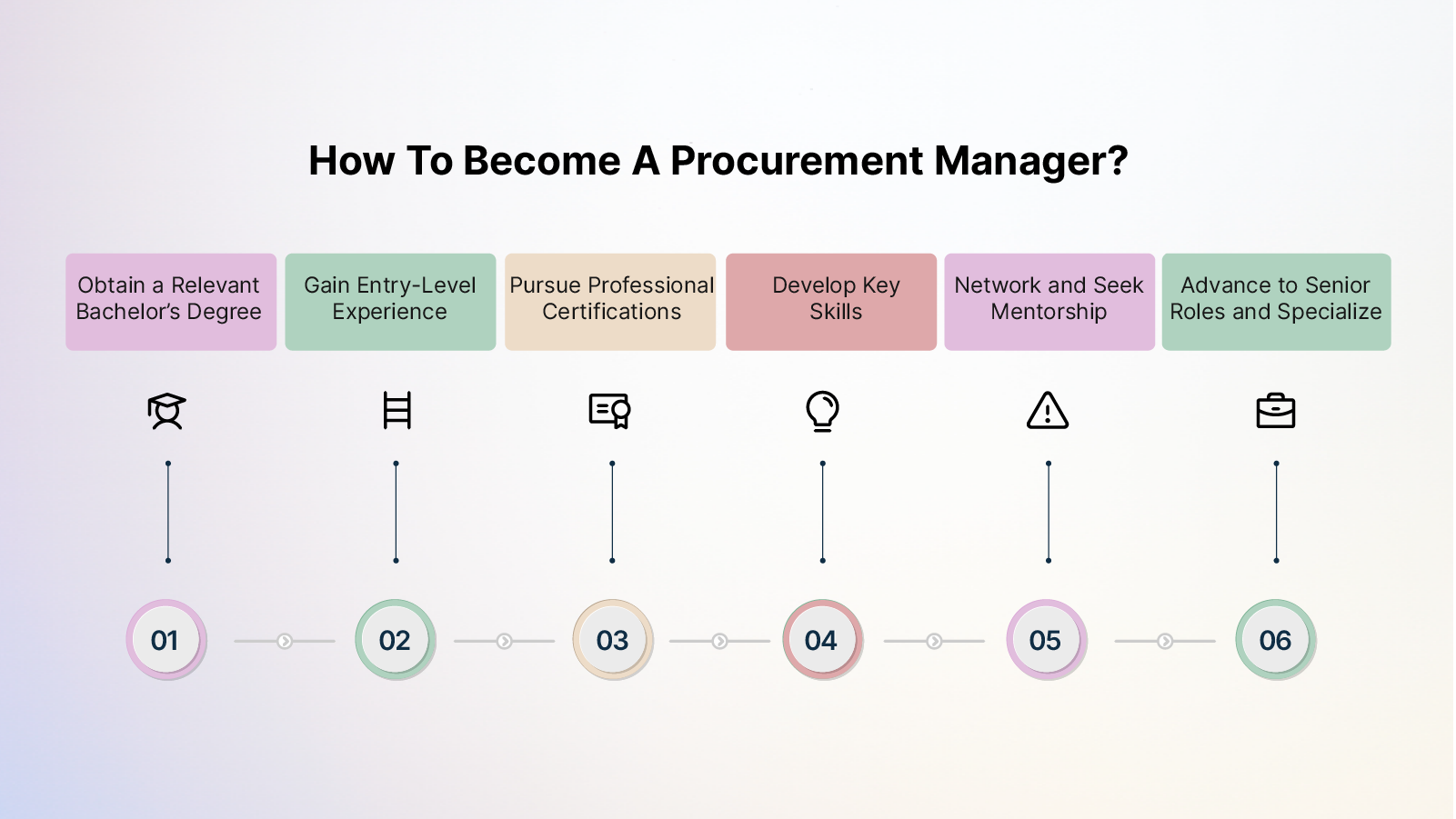
Here are steps to become a procurement manager:
1. Obtain a Relevant Bachelor’s Degree
A degree in supply chain management or business covers logistics, finance, and procurement principles. These provide the essential knowledge and exposure for an aspiring procurement manager. Many programs also offer internships that give students practical experience in the field.
2. Gain Entry-Level Experience
Roles like procurement analyst provide hands-on experience in vendor management and negotiation. It builds a solid foundation for career advancement. Starting with entry-level roles helps develop a deeper understanding of the procurement process and operational challenges.
3. Pursue Professional Certifications
Certifications like CPSM and CSCP add credibility and skills in advanced procurement, making candidates more attractive to potential employers. These credentials demonstrate a commitment to the field and a readiness for greater responsibilities.
4. Develop Key Skills
Skills in negotiation, analysis, and relationship management support effective sourcing, supplier engagement, and cost-saving in procurement. Developing these skills prepares procurement managers to handle complex scenarios and make strategic decisions.
5. Network and Seek Mentorship
Industry connections through networking and mentorship provide guidance, job opportunities, and insights into best practices from experienced professionals. Mentorship can also offer valuable career advice and open doors to new opportunities.
6. Advance to Senior Roles and Specialize
Specializing in areas like strategic sourcing can lead to senior positions, such as procurement manager or director, with greater responsibilities. Advancement also often comes with leadership roles, overseeing procurement teams, and broader operational strategies.
Frequently Asked Questions on Procurement Manager Role
What skills are essential for a procurement manager role?
Key skills include negotiation, analytical thinking, and financial acumen, and relationship management. These abilities help procurement managers to build strong supplier partnerships, secure favorable terms, and assess cost-saving opportunities.
How can procurement managers handle supply chain disruptions?
To manage disruptions, procurement managers develop contingency plans, diversify suppliers, and maintain strong communication with vendors. This proactive approach helps maintain business continuity and minimizes the impact of unexpected issues.
What are the most common challenges procurement managers face?
Challenges include managing supplier risks, ensuring compliance, maintaining cost efficiency, and maintaining data accuracy. Procurement managers must also navigate complex supply chains and ensure transparency across procurement processes.
What are some effective strategies for negotiating with suppliers?
Effective strategies include thorough research, understanding supplier needs, and setting clear objectives. Procurement managers should aim for win-win outcomes, using data and market insights to get optimal terms and prices.
How does a procurement manager ensure compliance with regulations?
Procurement managers ensure compliance by implementing robust policies, conducting regular audits, and staying updated on regulatory changes. They also work closely with legal and compliance teams to uphold standards and mitigate risks.
What qualifications and certifications are beneficial for a procurement manager?
A relevant bachelor’s degree and certifications like CPSM, CSCP, or CIPS enhance credibility. These credentials demonstrate expertise in procurement principles, strategic sourcing, and supply chain management.
What Is A Procurement Manager?
A procurement manager oversees the sourcing and purchasing of goods and services for a business. They develop strategies, manage supplier relationships, negotiate contracts, and ensure cost-effective and timely procurement, all while aligning with organizational goals and maintaining compliance with regulations.
What should procurement leaders focus on in 2025?
Procurement leaders, whether a purchasing manager or chief procurement officer, must align with digital transformation and evolving market trends. They should prioritize using procurement software for better data analysis and visibility across the procurement lifecycle. Key areas include optimizing procurement KPIs, improving vendor selection and supplier evaluation, and managing supply chain risk. Staying agile with tech-driven tools ensures smarter decisions and long-term success.










.png)




.png)










.avif)





